新人教版必修1Unit2 English around the world知识点课件(47张ppt)
文档属性
| 名称 | 新人教版必修1Unit2 English around the world知识点课件(47张ppt) |
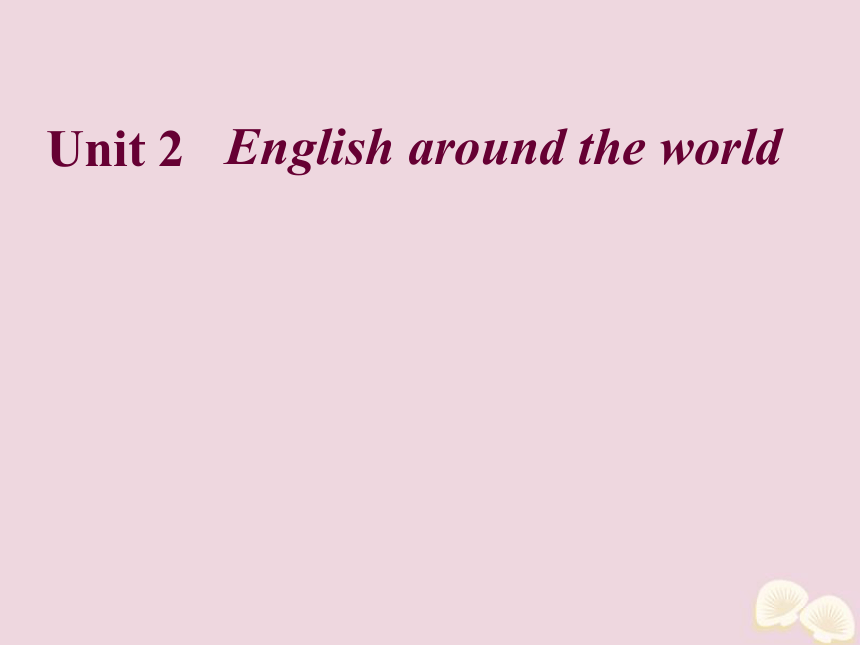
|
|
| 格式 | zip | ||
| 文件大小 | 491.0KB | ||
| 资源类型 | 教案 | ||
| 版本资源 | 人教版(新课程标准) | ||
| 科目 | 英语 | ||
| 更新时间 | 2019-08-25 00:00:00 | ||
图片预览

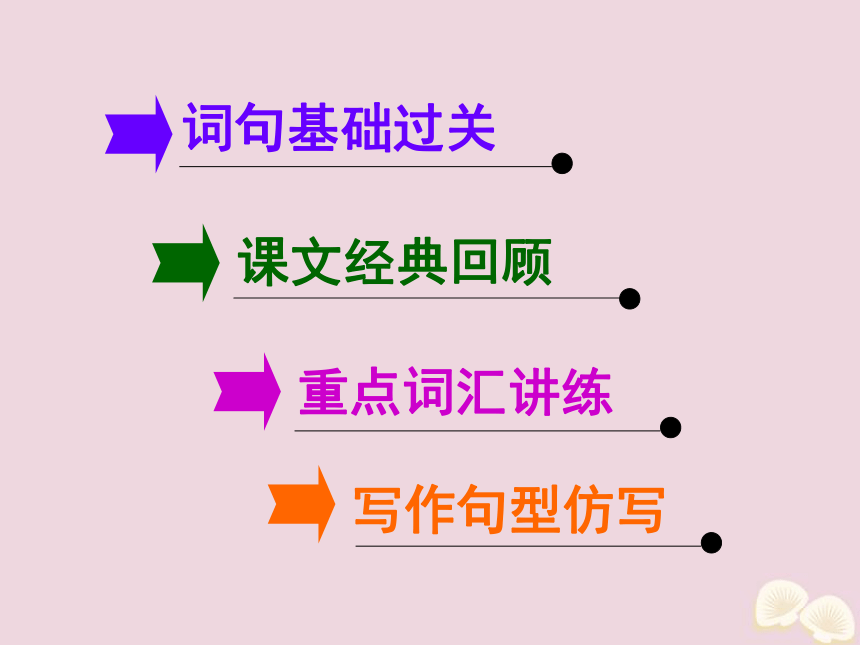

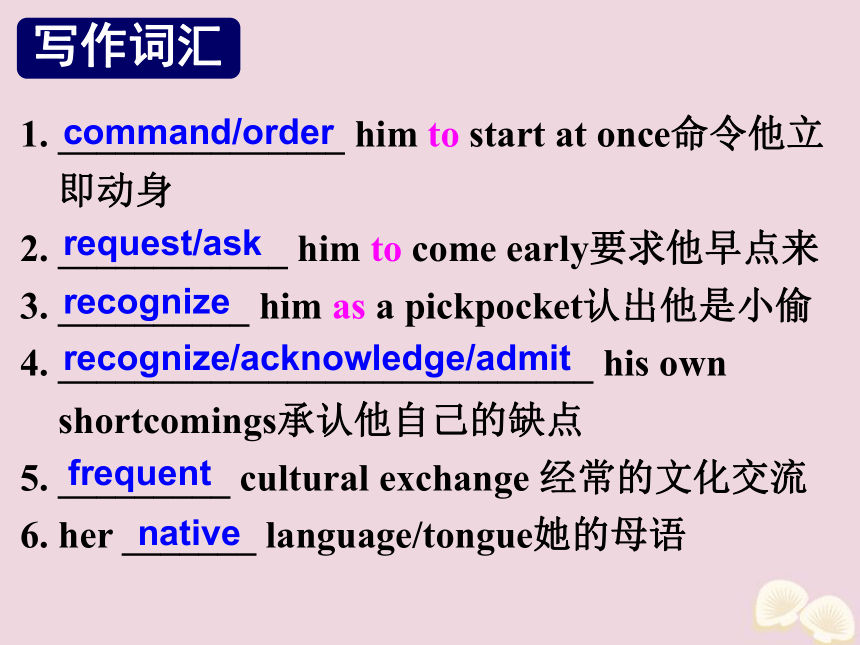
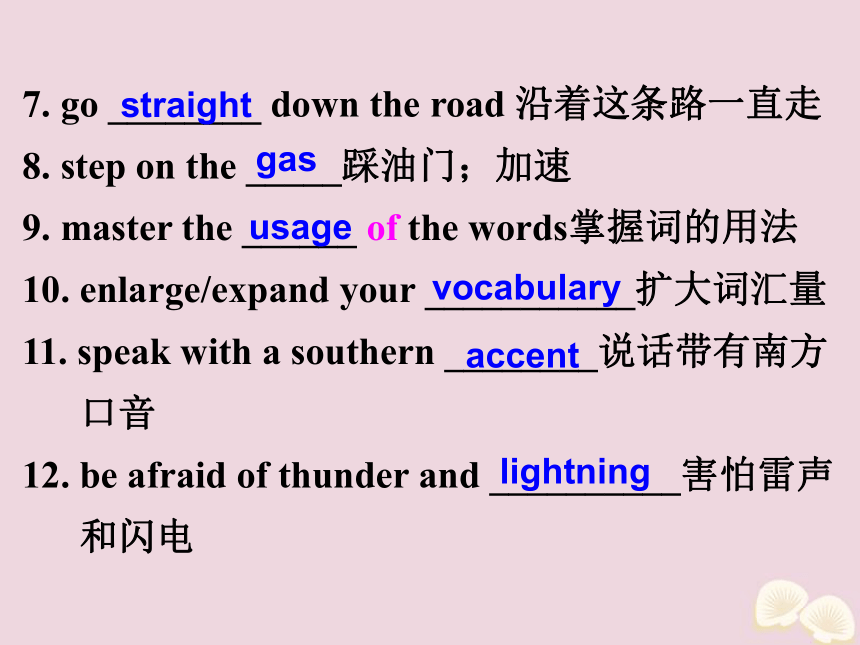
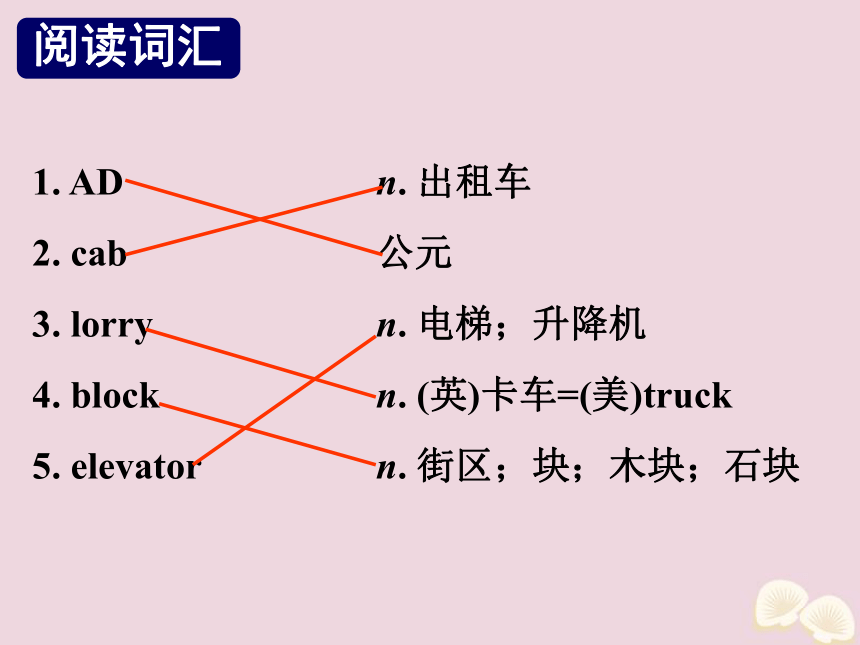
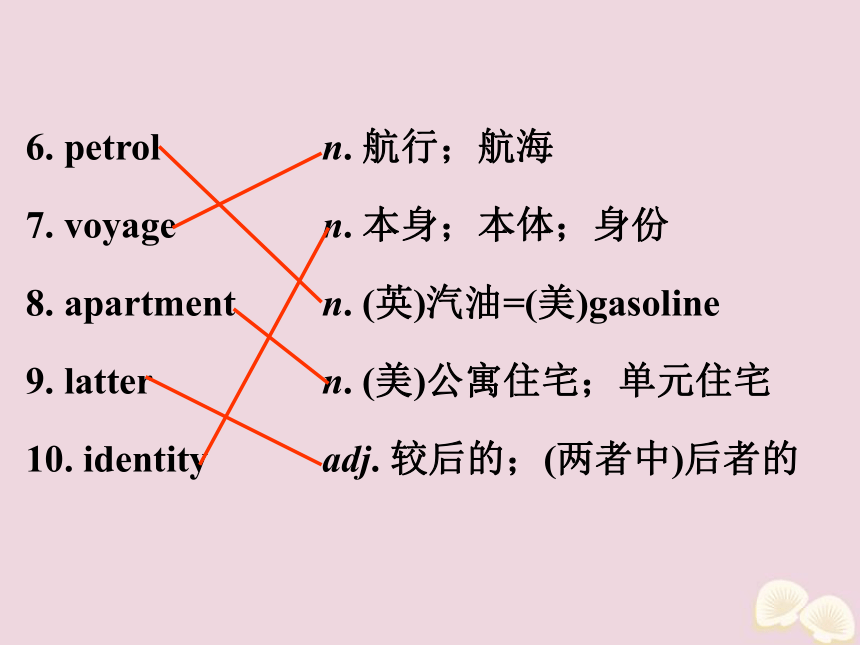
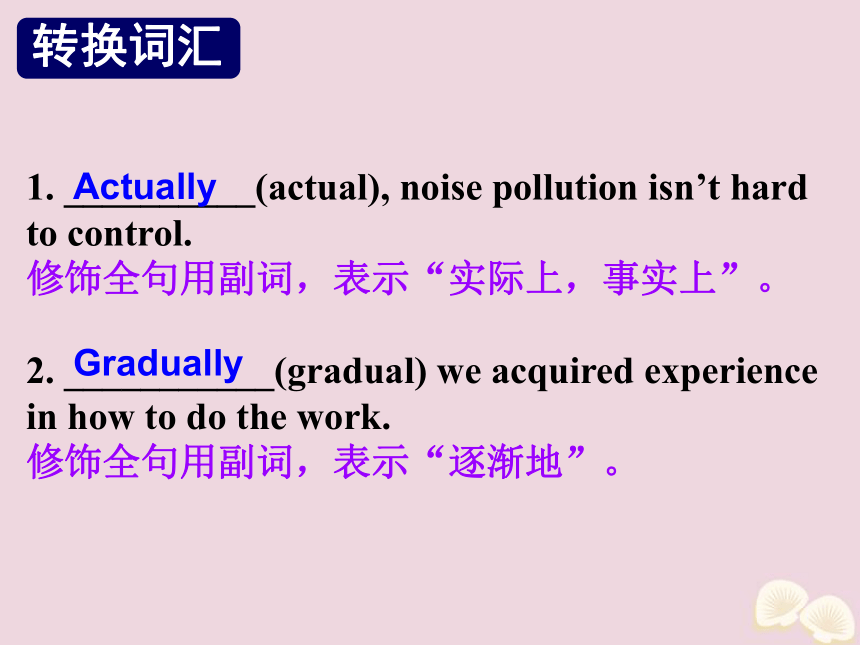
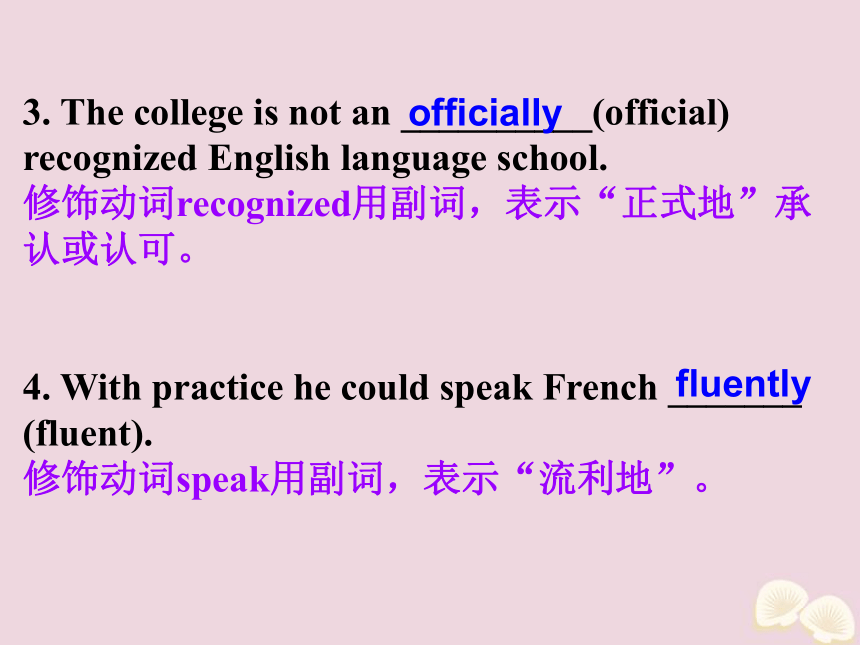
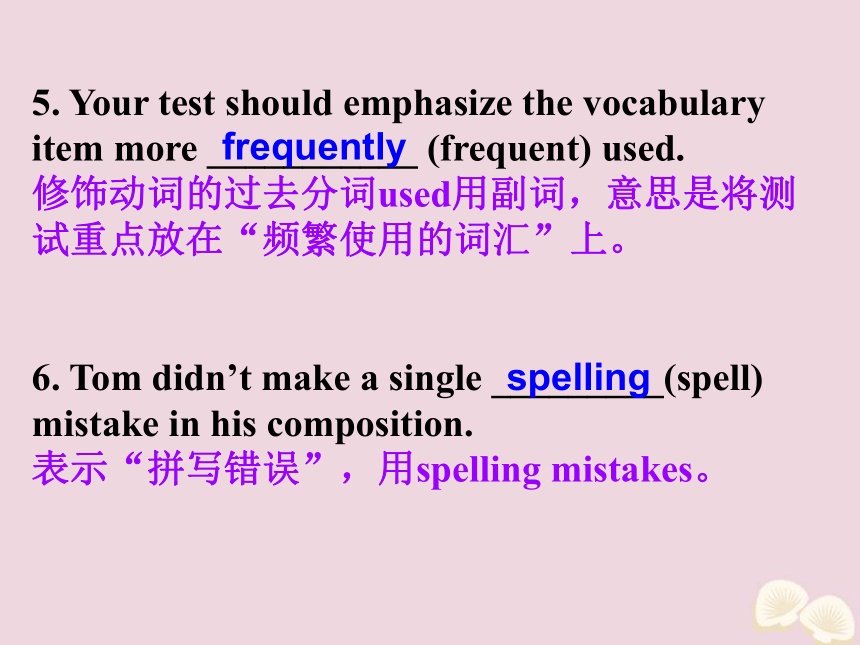
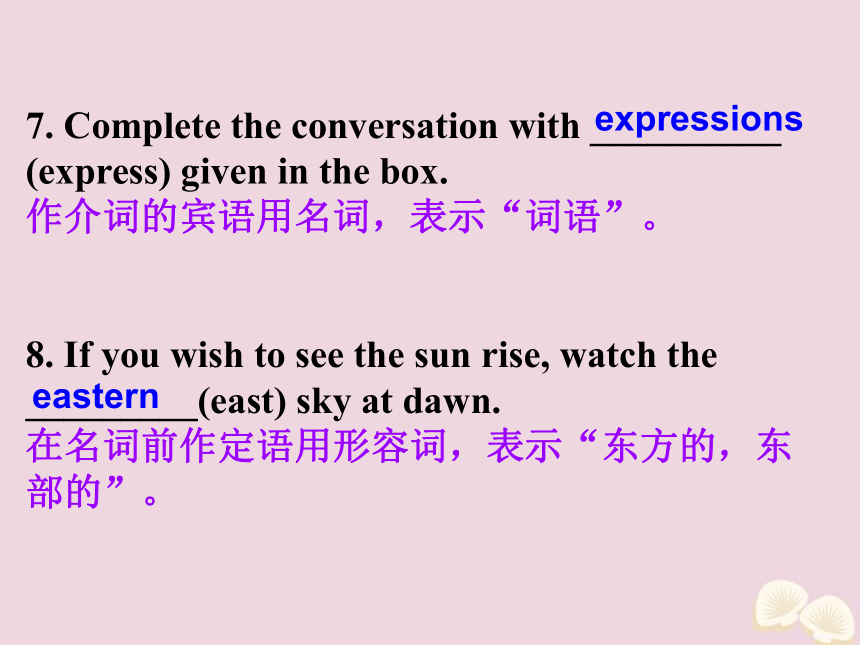
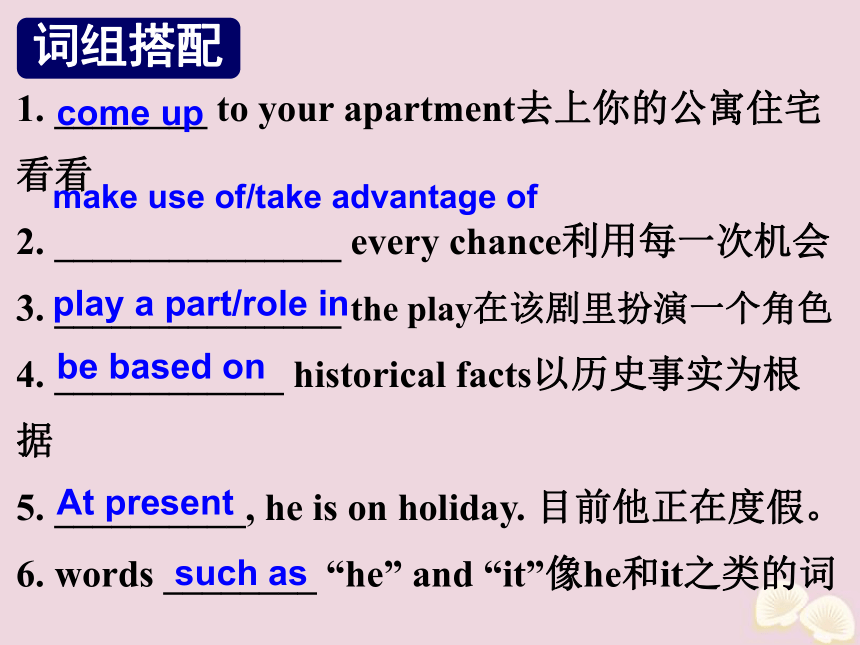
文档简介
(共47张PPT)
Unit 2
English around the world
课文经典回顾
重点词汇讲练
写作句型仿写
词句基础过关
1. _______________ him to start at once命令他立
即动身
2. ____________ him to come early要求他早点来
3. __________ him as a pickpocket认出他是小偷
4. ____________________________ his own
shortcomings承认他自己的缺点
5. _________ cultural exchange 经常的文化交流
6. her _______ language/tongue她的母语
native
command/order
request/ask
recognize
recognize/acknowledge/admit
frequent
7. go ________ down the road 沿着这条路一直走
8. step on the _____踩油门;加速
9. master the ______ of the words掌握词的用法
10. enlarge/expand your ___________扩大词汇量
11. speak with a southern ________说话带有南方
口音
12. be afraid of thunder and __________害怕雷声
和闪电
lightning
straight
gas
usage
vocabulary
accent
1. AD n. 出租车
2. cab 公元
3. lorry n. 电梯;升降机
4. block n. (英)卡车=(美)truck
5. elevator n. 街区;块;木块;石块
6. petrol n. 航行;航海
7. voyage n. 本身;本体;身份
8. apartment n. (英)汽油=(美)gasoline
9. latter n. (美)公寓住宅;单元住宅
10. identity adj. 较后的;(两者中)后者的
1. __________(actual), noise pollution isn’t hard to control.
修饰全句用副词,表示“实际上,事实上”。
2. ___________(gradual) we acquired experience in how to do the work.
修饰全句用副词,表示“逐渐地”。
Actually
Gradually
3. The college is not an __________(official) recognized English language school.
修饰动词recognized用副词,表示“正式地”承认或认可。
4. With practice he could speak French _______ (fluent).
修饰动词speak用副词,表示“流利地”。
fluently
officially
5. Your test should emphasize the vocabulary item more ___________ (frequent) used.
修饰动词的过去分词used用副词,意思是将测试重点放在“频繁使用的词汇”上。
6. Tom didn’t make a single _________(spell) mistake in his composition.
表示“拼写错误”,用spelling mistakes。
frequently
spelling
7. Complete the conversation with __________ (express) given in the box.
作介词的宾语用名词,表示“词语”。
8. If you wish to see the sun rise, watch the _________(east) sky at dawn.
在名词前作定语用形容词,表示“东方的,东部的”。
expressions
eastern
1. ________ to your apartment去上你的公寓住宅看看
2. _______________ every chance利用每一次机会
3. _______________ the play在该剧里扮演一个角色
4. ____________ historical facts以历史事实为根据
5. __________, he is on holiday. 目前他正在度假。
6. words ________ “he” and “it”像he和it之类的词
such as
come up
make use of/take advantage of
play a part/role in
be based on
At present
7. be postponed ___________ rain因下雨被推迟了
8. have a good command ____ French精通法语
9. refuse his request _____ money拒绝他要钱的
请求
10. request that he _______________(come) early
要求他早点来
11. command that he ___________(go) at once命
令他立即就去
(should) go
because of
of
for
(should) come
1. Native English speakers can understand each other even ___________ they don’t speak _____ same kind of English.以英语为母语的人,即使他们所讲的英语不尽相同,也可以相互理解。
the
if/though
2. It was based more on German _______the English we speak at present.当时更多地是以德语为基础,而不是以我们今天所说的英语为基础。
3. Believe it or not,there is no _______thing as standard English.信不信由你,(世界上)没有什么标准英语。
such
than
4. Today the number of people learning English in China _______________(increase) rapidly. 目前中国学习英语的人数正在迅速增长。
5. However,on TV and the radio you will hear differences ____the way they speak.然而,在电视上或收音机上,人们讲的英语会有所不同。
in
is increasing
So why has English changed over time?
1 __________(actual) all languages change and develop when cultures meet and communicate with each other. At first the English 2 ________ (speak) in England between about AD 450 and 1150 was very different from the English spoken today. It was based more 3 _____German than the English we speak at present.
Actually
spoken
on
Then gradually between about AD 800 and 1150, English 4 __________(become) less like German because those 5 _______ruled England spoke first Danish and later French. These new 6 _________ (settle) enriched the English language and especially its vocabulary. So by the 1600’s Shakespeare was able to make use of a 7 _______ (wide) vocabulary than ever before. In 1620 some British settlers moved to America. Later in the 8 ____________ (eighteen) century some British people 9 _________ (take) to Australia too. English began to be spoken in both 10 __________ (country).
countries
became
who
settlers
wider
eighteenth
were taken
English now is also spoken as a foreign and
second language in South Asia. For example,
India has a very large number of fluently English
speakers so Britain ruled India from 1765 to 1947.
During that time English become the language
for government and education.
English is also spoken in Singapore and Malaysia
and country in Africa such as South Africa.
Today the number of people learning English in China are increasing rapid. In a fact, China may
have the largest number of English learner. Will
Chinese English develop own identity? Only time will tell.
1. and→ or 表示选择,意为“或者”。
2. fluently→ fluent 作定语,修饰English speakers,用形容词。
3. so→ because 英国统治印度是印度讲英语的人多的原因,引导原因状语从句用because。
4. become→ became 因During that time就是from 1765 to 1947,当然就是过去时间了,用一般过去时。
5. country→ countries 指在非洲的国家,非洲不止一个国家,故用复数。
6. are→ is 因the number of… (……的数量)作主语,谓语动词用单数。比较: a number of…作主语,谓语动词就要用复数。
7. rapid→ rapidly 作状语,修饰谓语,意为“迅速增加”,用副词。
8. 去掉fact前的a 因为in fact (=in effect, in reality, actually事实上,实际上)是固定词组。
9. learner→ learners 学英语的人最多,可见不止一个,多于一个就要用复数。
10. 在own前加its 因own的前面习惯上要有物主代词,指“中式英语的”,故用its。
1. base n.底部;基础
vt.以……为基础/根据
be based on 以……为基础/根据
on the basis of 在……的基础上
⑴ 我们是在实验的基础上得出这个结论的。
We drew this conclusion ________________
______________.
⑵ 我们的意见应该以事实为依据。
We should base our opinions on facts./
Our opinions should be based on facts.
on the basis of
experiments
2. command n. & vt. 命令;指令;掌握
command that sb (should) do sth=command sb to do sth 命令某人做某事
be under the command of由……指挥/控制
have a good command of精通
像command一样,其后的名词性从句的谓语动词用“(should+)动词原形”的常用词有:
一个“坚持(insist)”;
两道“命令(order,command)”;
三条“建议(suggest,advise,propose)”;
四点“要求(demand, ask,require,request)”。
⑴ The army is _______ the king’s direct command.
⑵ My father commanded me _______(do) my homework right now.
⑶ He commanded that the girl ___________ (leave) at once.
⑷ Employees in this company need to have a good command ____ English.
of
under
to do
(should) leave
3. request v. & n.请求;要求
request that sb (should) do sth=
request sb to do sth 要求某人做某事
⑴ The boss requested the young man ________ (write) a letter of recommendation.
⑵ The boss requested that the young man ____________(write) a letter of recommendation.
(should) write
to write
4. recognize vt.认出(know sb/sth again);
承认 (admit);公认(accept)
recognize…as/to be 承认/认为……是
⑴ 我承认我的缺点。
I recognize my own shortcomings.
⑵ 她变得我简直认不出来了。
She had changed so much _________________
______________.
⑶ 他被认为是我们学校最优秀的足球运动员。
He is recognized as/to be the best football player in our school.
that I could hardly
recognize her
5. because 因为(连词,后接从句)
because of 因为(短语介词,后接名词、
代词或what从句)
表示原因的短语还有thanks to,owing to,due to,as the result of等。
⑴ He walked slowly ___________ his injured leg.
⑵ He walked slowly ________ his leg was injured.
⑶ We have to cancel our trip ___________ the bad weather.
用because或because of填空。
because of
because of
because
6. come up 走近;上来;长出;发芽
The little boy came up to the stranger and showed him how to get to the police station. 小男孩走到这个陌生人跟前给他指到警察局的路。
come up to 达到(某标准);升到(某点)
come up with 想出(办法;主意)
come about 发生
come across 穿过;遇见
come to 总计;达到;苏醒
come out 出现;出版;发表
when it comes to…当谈到……
⑴ We won’t forget the day when we watched the sun _________ on the top of Mount Tai.
⑵ It’s certain that he will ______________ a new idea of solving the problem.
⑶ He ____________ the policeman and asked the way.
came up to
come up
come up with
7. such as 例如;像……一样的;
诸如……之类的
such as短语介词,只能放在名词前,可举其中几个例子。
for example (例如)副词词组,可放句首、句中或句末,其前后常有标点,可列举同类中的一个或几个例子。例子可以是一个名词、一个句子、一件事、一个故事等。
用such as或for example填空。
⑴ You can buy fruit here—oranges and bananas, ____________.
⑵ You can use any two colors—___________, red and yellow.
for example
for example
⑶ He enjoys team sports ________basketball, football, and volley ball.
⑷ Words _________“he”, “it”, “who”, and “anything” are pronouns.
⑸ The hospital has to treat emergencies ________ car accidents.
such as
such as
such as
8. make (good/ full) use of(好好/ 充分)利用;
使用
We should try to ______________(利用) every chance we have to speak English.
make use of
1. even if=even though 即使(引导让步状语从句)
⑴ 即使下雨我也要去看你。
I will call on you even if _________.
⑵ 即使困难重重,你也应该坚持干下去。
Even if there are many difficulties,you ______
__________________.
insist on doing that
it rains
should
2. more…than…比……更……;
与其说……不如说……
⑴ 与其说他是个老师不如说他是个学者。
He is more a _________than a _________.
⑵ 幸运的是,他受的伤不重,只是受惊了。
Luckily,he was more __________ than ______.
hurt
scholar
teacher
frightened
3. This/ It is because…(+原因)这是因为……
This/ It is why…(+结果)这就是……的原因
⑴ 他没出席会议的原因是因为他突然病了。
He was absent from the meeting, and this was _________________________.
⑵ 这就是我们不相信他的原因。
This is the reason _______________________.
why we don’t trust him
because he fell ill suddenly
4. There is no such thing as + n.
没有像……这样的事
⑴ 世上没有免费的午餐这种事儿。
There is no such thing as a free lunch in the world.
⑵ 没有坏天气这回事,不一样的天空有不一样的美丽。
____________________________________;
every sky has its beauty.
There is no such thing as bad weather
Unit 2
English around the world
课文经典回顾
重点词汇讲练
写作句型仿写
词句基础过关
1. _______________ him to start at once命令他立
即动身
2. ____________ him to come early要求他早点来
3. __________ him as a pickpocket认出他是小偷
4. ____________________________ his own
shortcomings承认他自己的缺点
5. _________ cultural exchange 经常的文化交流
6. her _______ language/tongue她的母语
native
command/order
request/ask
recognize
recognize/acknowledge/admit
frequent
7. go ________ down the road 沿着这条路一直走
8. step on the _____踩油门;加速
9. master the ______ of the words掌握词的用法
10. enlarge/expand your ___________扩大词汇量
11. speak with a southern ________说话带有南方
口音
12. be afraid of thunder and __________害怕雷声
和闪电
lightning
straight
gas
usage
vocabulary
accent
1. AD n. 出租车
2. cab 公元
3. lorry n. 电梯;升降机
4. block n. (英)卡车=(美)truck
5. elevator n. 街区;块;木块;石块
6. petrol n. 航行;航海
7. voyage n. 本身;本体;身份
8. apartment n. (英)汽油=(美)gasoline
9. latter n. (美)公寓住宅;单元住宅
10. identity adj. 较后的;(两者中)后者的
1. __________(actual), noise pollution isn’t hard to control.
修饰全句用副词,表示“实际上,事实上”。
2. ___________(gradual) we acquired experience in how to do the work.
修饰全句用副词,表示“逐渐地”。
Actually
Gradually
3. The college is not an __________(official) recognized English language school.
修饰动词recognized用副词,表示“正式地”承认或认可。
4. With practice he could speak French _______ (fluent).
修饰动词speak用副词,表示“流利地”。
fluently
officially
5. Your test should emphasize the vocabulary item more ___________ (frequent) used.
修饰动词的过去分词used用副词,意思是将测试重点放在“频繁使用的词汇”上。
6. Tom didn’t make a single _________(spell) mistake in his composition.
表示“拼写错误”,用spelling mistakes。
frequently
spelling
7. Complete the conversation with __________ (express) given in the box.
作介词的宾语用名词,表示“词语”。
8. If you wish to see the sun rise, watch the _________(east) sky at dawn.
在名词前作定语用形容词,表示“东方的,东部的”。
expressions
eastern
1. ________ to your apartment去上你的公寓住宅看看
2. _______________ every chance利用每一次机会
3. _______________ the play在该剧里扮演一个角色
4. ____________ historical facts以历史事实为根据
5. __________, he is on holiday. 目前他正在度假。
6. words ________ “he” and “it”像he和it之类的词
such as
come up
make use of/take advantage of
play a part/role in
be based on
At present
7. be postponed ___________ rain因下雨被推迟了
8. have a good command ____ French精通法语
9. refuse his request _____ money拒绝他要钱的
请求
10. request that he _______________(come) early
要求他早点来
11. command that he ___________(go) at once命
令他立即就去
(should) go
because of
of
for
(should) come
1. Native English speakers can understand each other even ___________ they don’t speak _____ same kind of English.以英语为母语的人,即使他们所讲的英语不尽相同,也可以相互理解。
the
if/though
2. It was based more on German _______the English we speak at present.当时更多地是以德语为基础,而不是以我们今天所说的英语为基础。
3. Believe it or not,there is no _______thing as standard English.信不信由你,(世界上)没有什么标准英语。
such
than
4. Today the number of people learning English in China _______________(increase) rapidly. 目前中国学习英语的人数正在迅速增长。
5. However,on TV and the radio you will hear differences ____the way they speak.然而,在电视上或收音机上,人们讲的英语会有所不同。
in
is increasing
So why has English changed over time?
1 __________(actual) all languages change and develop when cultures meet and communicate with each other. At first the English 2 ________ (speak) in England between about AD 450 and 1150 was very different from the English spoken today. It was based more 3 _____German than the English we speak at present.
Actually
spoken
on
Then gradually between about AD 800 and 1150, English 4 __________(become) less like German because those 5 _______ruled England spoke first Danish and later French. These new 6 _________ (settle) enriched the English language and especially its vocabulary. So by the 1600’s Shakespeare was able to make use of a 7 _______ (wide) vocabulary than ever before. In 1620 some British settlers moved to America. Later in the 8 ____________ (eighteen) century some British people 9 _________ (take) to Australia too. English began to be spoken in both 10 __________ (country).
countries
became
who
settlers
wider
eighteenth
were taken
English now is also spoken as a foreign and
second language in South Asia. For example,
India has a very large number of fluently English
speakers so Britain ruled India from 1765 to 1947.
During that time English become the language
for government and education.
English is also spoken in Singapore and Malaysia
and country in Africa such as South Africa.
Today the number of people learning English in China are increasing rapid. In a fact, China may
have the largest number of English learner. Will
Chinese English develop own identity? Only time will tell.
1. and→ or 表示选择,意为“或者”。
2. fluently→ fluent 作定语,修饰English speakers,用形容词。
3. so→ because 英国统治印度是印度讲英语的人多的原因,引导原因状语从句用because。
4. become→ became 因During that time就是from 1765 to 1947,当然就是过去时间了,用一般过去时。
5. country→ countries 指在非洲的国家,非洲不止一个国家,故用复数。
6. are→ is 因the number of… (……的数量)作主语,谓语动词用单数。比较: a number of…作主语,谓语动词就要用复数。
7. rapid→ rapidly 作状语,修饰谓语,意为“迅速增加”,用副词。
8. 去掉fact前的a 因为in fact (=in effect, in reality, actually事实上,实际上)是固定词组。
9. learner→ learners 学英语的人最多,可见不止一个,多于一个就要用复数。
10. 在own前加its 因own的前面习惯上要有物主代词,指“中式英语的”,故用its。
1. base n.底部;基础
vt.以……为基础/根据
be based on 以……为基础/根据
on the basis of 在……的基础上
⑴ 我们是在实验的基础上得出这个结论的。
We drew this conclusion ________________
______________.
⑵ 我们的意见应该以事实为依据。
We should base our opinions on facts./
Our opinions should be based on facts.
on the basis of
experiments
2. command n. & vt. 命令;指令;掌握
command that sb (should) do sth=command sb to do sth 命令某人做某事
be under the command of由……指挥/控制
have a good command of精通
像command一样,其后的名词性从句的谓语动词用“(should+)动词原形”的常用词有:
一个“坚持(insist)”;
两道“命令(order,command)”;
三条“建议(suggest,advise,propose)”;
四点“要求(demand, ask,require,request)”。
⑴ The army is _______ the king’s direct command.
⑵ My father commanded me _______(do) my homework right now.
⑶ He commanded that the girl ___________ (leave) at once.
⑷ Employees in this company need to have a good command ____ English.
of
under
to do
(should) leave
3. request v. & n.请求;要求
request that sb (should) do sth=
request sb to do sth 要求某人做某事
⑴ The boss requested the young man ________ (write) a letter of recommendation.
⑵ The boss requested that the young man ____________(write) a letter of recommendation.
(should) write
to write
4. recognize vt.认出(know sb/sth again);
承认 (admit);公认(accept)
recognize…as/to be 承认/认为……是
⑴ 我承认我的缺点。
I recognize my own shortcomings.
⑵ 她变得我简直认不出来了。
She had changed so much _________________
______________.
⑶ 他被认为是我们学校最优秀的足球运动员。
He is recognized as/to be the best football player in our school.
that I could hardly
recognize her
5. because 因为(连词,后接从句)
because of 因为(短语介词,后接名词、
代词或what从句)
表示原因的短语还有thanks to,owing to,due to,as the result of等。
⑴ He walked slowly ___________ his injured leg.
⑵ He walked slowly ________ his leg was injured.
⑶ We have to cancel our trip ___________ the bad weather.
用because或because of填空。
because of
because of
because
6. come up 走近;上来;长出;发芽
The little boy came up to the stranger and showed him how to get to the police station. 小男孩走到这个陌生人跟前给他指到警察局的路。
come up to 达到(某标准);升到(某点)
come up with 想出(办法;主意)
come about 发生
come across 穿过;遇见
come to 总计;达到;苏醒
come out 出现;出版;发表
when it comes to…当谈到……
⑴ We won’t forget the day when we watched the sun _________ on the top of Mount Tai.
⑵ It’s certain that he will ______________ a new idea of solving the problem.
⑶ He ____________ the policeman and asked the way.
came up to
come up
come up with
7. such as 例如;像……一样的;
诸如……之类的
such as短语介词,只能放在名词前,可举其中几个例子。
for example (例如)副词词组,可放句首、句中或句末,其前后常有标点,可列举同类中的一个或几个例子。例子可以是一个名词、一个句子、一件事、一个故事等。
用such as或for example填空。
⑴ You can buy fruit here—oranges and bananas, ____________.
⑵ You can use any two colors—___________, red and yellow.
for example
for example
⑶ He enjoys team sports ________basketball, football, and volley ball.
⑷ Words _________“he”, “it”, “who”, and “anything” are pronouns.
⑸ The hospital has to treat emergencies ________ car accidents.
such as
such as
such as
8. make (good/ full) use of(好好/ 充分)利用;
使用
We should try to ______________(利用) every chance we have to speak English.
make use of
1. even if=even though 即使(引导让步状语从句)
⑴ 即使下雨我也要去看你。
I will call on you even if _________.
⑵ 即使困难重重,你也应该坚持干下去。
Even if there are many difficulties,you ______
__________________.
insist on doing that
it rains
should
2. more…than…比……更……;
与其说……不如说……
⑴ 与其说他是个老师不如说他是个学者。
He is more a _________than a _________.
⑵ 幸运的是,他受的伤不重,只是受惊了。
Luckily,he was more __________ than ______.
hurt
scholar
teacher
frightened
3. This/ It is because…(+原因)这是因为……
This/ It is why…(+结果)这就是……的原因
⑴ 他没出席会议的原因是因为他突然病了。
He was absent from the meeting, and this was _________________________.
⑵ 这就是我们不相信他的原因。
This is the reason _______________________.
why we don’t trust him
because he fell ill suddenly
4. There is no such thing as + n.
没有像……这样的事
⑴ 世上没有免费的午餐这种事儿。
There is no such thing as a free lunch in the world.
⑵ 没有坏天气这回事,不一样的天空有不一样的美丽。
____________________________________;
every sky has its beauty.
There is no such thing as bad weather
